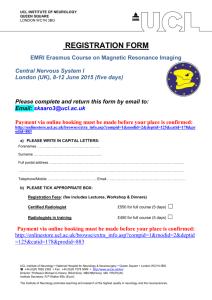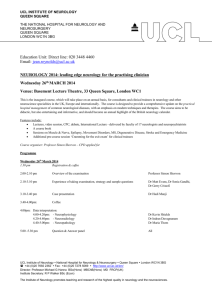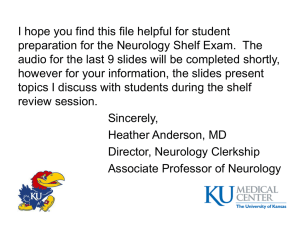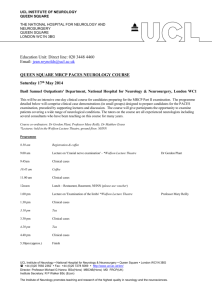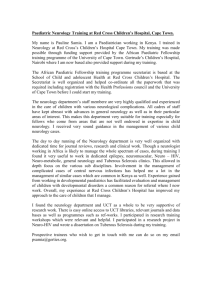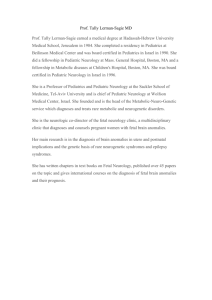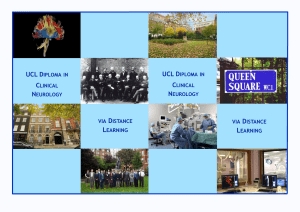Diploma in Clinical Neurology via Distance Learning
advertisement
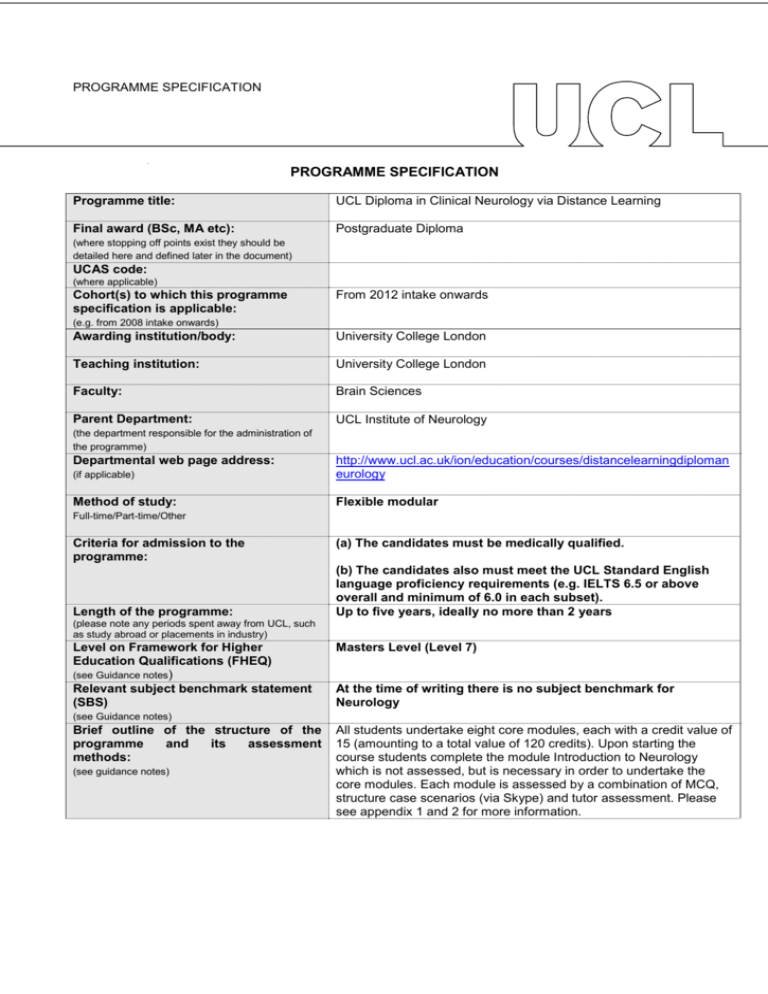
PROGRAMME SPECIFICATION PROGRAMME SPECIFICATION Programme title: UCL Diploma in Clinical Neurology via Distance Learning Final award (BSc, MA etc): Postgraduate Diploma (where stopping off points exist they should be detailed here and defined later in the document) UCAS code: (where applicable) Cohort(s) to which this programme specification is applicable: From 2012 intake onwards (e.g. from 2008 intake onwards) Awarding institution/body: University College London Teaching institution: University College London Faculty: Brain Sciences Parent Department: UCL Institute of Neurology (the department responsible for the administration of the programme) Departmental web page address: (if applicable) http://www.ucl.ac.uk/ion/education/courses/distancelearningdiploman eurology Method of study: Flexible modular Full-time/Part-time/Other Criteria for admission to the programme: Length of the programme: (a) The candidates must be medically qualified. (b) The candidates also must meet the UCL Standard English language proficiency requirements (e.g. IELTS 6.5 or above overall and minimum of 6.0 in each subset). Up to five years, ideally no more than 2 years (please note any periods spent away from UCL, such as study abroad or placements in industry) Level on Framework for Higher Education Qualifications (FHEQ) (see Guidance notes) Relevant subject benchmark statement (SBS) Masters Level (Level 7) At the time of writing there is no subject benchmark for Neurology (see Guidance notes) Brief outline of the structure of the programme and its assessment methods: (see guidance notes) All students undertake eight core modules, each with a credit value of 15 (amounting to a total value of 120 credits). Upon starting the course students complete the module Introduction to Neurology which is not assessed, but is necessary in order to undertake the core modules. Each module is assessed by a combination of MCQ, structure case scenarios (via Skype) and tutor assessment. Please see appendix 1 and 2 for more information. Board of Examiners: Name of Board of Examiners: Clinical Neurology (existing board) Professional body accreditation (if applicable): n/a Date of next scheduled accreditation visit: EDUCATIONAL AIMS OF THE PROGRAMME: To provide high quality distance learning provision in Clinical Neurology for qualified medical graduates from the UK, Europe and outside the European Union. The overall aim is to improve the practice of clinical neurology and to provide an up to date scientific underpinning for clinicians who would otherwise not be able to access UCL degrees. PROGRAMME OUTCOMES: The programme provides opportunities for students to develop and demonstrate knowledge and understanding, qualities, skills and other attributes in the following areas: A: Knowledge and understanding Knowledge and understanding of: Teaching/learning methods and strategies: Neurology All didactic neurology teaching is delivered via original 20 minute interactive sessions written by UK neurologists, and delivered in Moodle. Clinical Teaching Fellow support is also provided via skype and email Peer to peer (moderated) discussion forum in Moodle Assessment: Tutor assessment MCQs taken in Moodle Structure Case Scenarios B: Skills and other attributes Intellectual (thinking) skills: Teaching/learning methods and strategies: Neurology, and science underpinning neurology Sessions are structured and UCL modules ordered (pre-requisites), i.e. students must complete basic modules before progressing to advanced modules. Formative MCQs, with feedback, conclude each 20 minute online session. Supporting material directed to students by Clinical Teaching Fellow and available on Moodle Assessment: MCQs and structure case scenarios C: Skills and other attributes Practical skills (able to): Teaching/learning methods and strategies: History taking and clinical examination This is an academic programme delivered at a distance with no face to face practical component. History taking and clinical examination skills are explained within the basic Neurology sessions, in illustrations, videos and diagrams, and assessed as below, but it is important to note that clinical skills are not practically tested face to face as part of this programme. Assessment: Good practice in history taking and examination are assessed through MCQ. An element of active testing of practical skills is undertaken through skype based structured case scenarios, but no clinical examinations in the conventional sense (i.e. clinical testing stations) are undertaken. D: Skills and other attributes Transferable skills (able to): Teaching/learning methods and strategies: Studying online The course is delivered online in a flexible modular structure, assessments are delivered online and via skype. Students are encouraged to use moderated discussion forum. Other clinical disciplines Provided a student is medically qualified they can undertake this course. It makes it accessible to clinicians from other specialities (i.e. GPs, psychiatry, geriatrics, paediatrics), giving them a basic understanding of the neurology curriculum. Assessment: MCQs, structured case scenarios, tutor assessment The following reference points were used in designing the programme: the Framework for Higher Education Qualifications: (http://www.qaa.ac.uk/en/Publications/Documents/Framework-Higher-Education-Qualifications-08.pdf); the relevant Subject Benchmark Statements: (http://www.qaa.ac.uk/assuring-standards-and-quality/the-quality-code/subject-benchmark-statements); the programme specifications for UCL degree programmes in relevant subjects (where applicable); UCL teaching and learning policies; staff research. Please note: This specification provides a concise summary of the main features of the programme and the learning outcomes that a typical student might reasonably be expected to achieve and demonstrate if he/she takes full advantage of the learning opportunities that are provided. More detailed information on the learning outcomes, content and teaching, learning and assessment methods of each course unit/module can be found in the departmental course handbook. The accuracy of the information contained in this document is reviewed annually by UCL and may be checked by the Quality Assurance Agency. Programme Organiser(s) Professor Simon Shorvon, Dr Caroline Selai and Dr Amit Batla Name(s): Date of Production: March 2011 (Programme approval process) Date of Review: October 2014 Date approved by Head of Department: October 2014 Date approved by Chair of Departmental Teaching Committee: Date approved by Faculty Teaching Committee October 2014 November 2014
